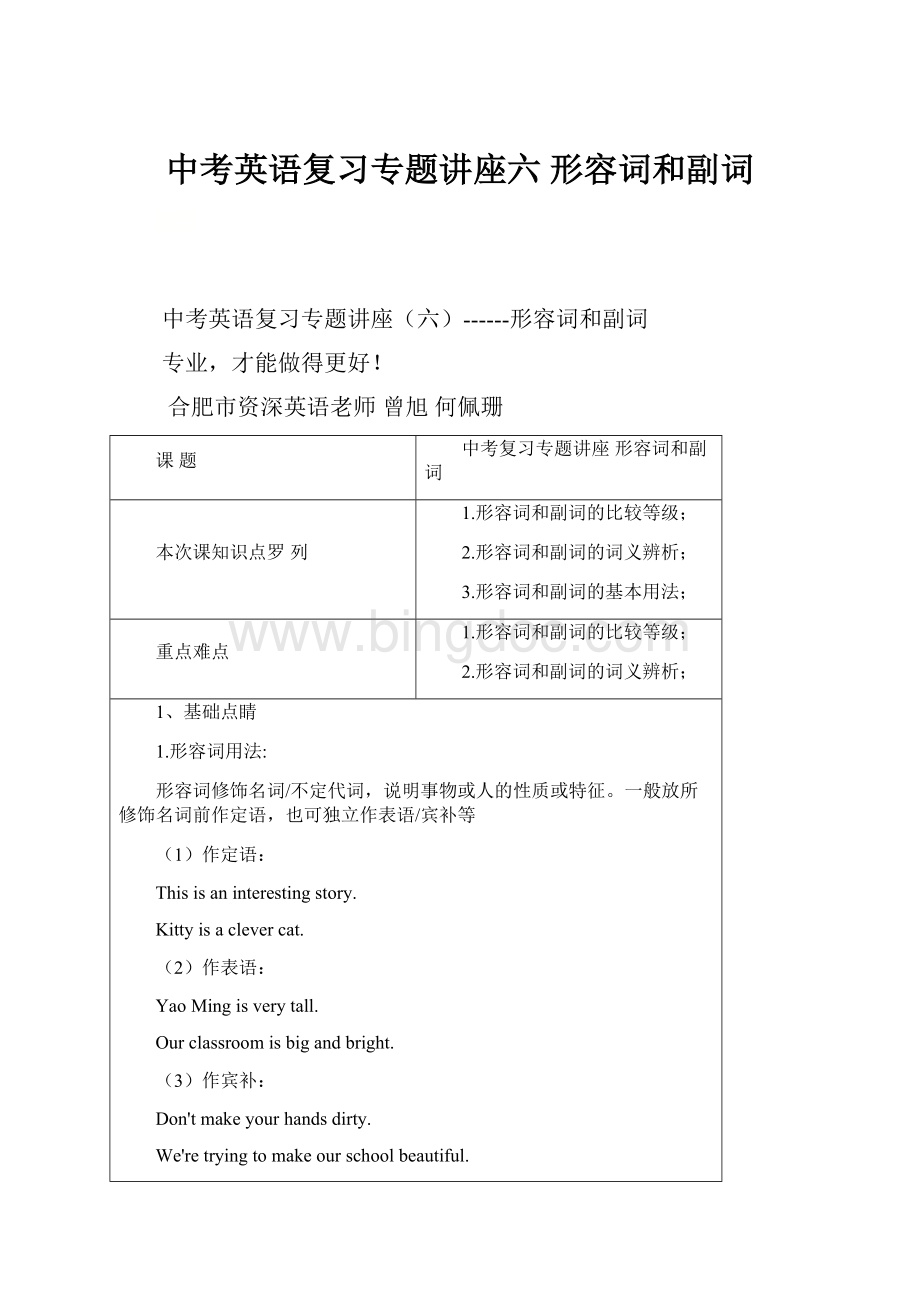中考英语复习专题讲座六 形容词和副词.docx
《中考英语复习专题讲座六 形容词和副词.docx》由会员分享,可在线阅读,更多相关《中考英语复习专题讲座六 形容词和副词.docx(12页珍藏版)》请在冰点文库上搜索。

中考英语复习专题讲座六形容词和副词
中考英语复习专题讲座(六)------形容词和副词
专业,才能做得更好!
合肥市资深英语老师曾旭何佩珊
课题
中考复习专题讲座形容词和副词
本次课知识点罗列
1.形容词和副词的比较等级;
2.形容词和副词的词义辨析;
3.形容词和副词的基本用法;
重点难点
1.形容词和副词的比较等级;
2.形容词和副词的词义辨析;
1、基础点睛
1.形容词用法:
形容词修饰名词/不定代词,说明事物或人的性质或特征。
一般放所修饰名词前作定语,也可独立作表语/宾补等
(1)作定语:
Thisisaninterestingstory.
Kittyisaclevercat.
(2)作表语:
YaoMingisverytall.
Ourclassroomisbigandbright.
(3)作宾补:
Don'tmakeyourhandsdirty.
We'retryingtomakeourschoolbeautiful.
2.形容词的种类一般有:
(1)简单的形容词有:
good好的,green绿色的,long长的,bright明亮的
(2)带有前缀a-的形容词:
afraid害怕的,alike相同的,asleep睡着的
(3)由动词的分词构成的形容词:
interesting有兴趣的,exciting令人兴奋的;tired疲劳的;spoiled溺爱的
(4)复合形容词:
数词+名词+形容词,如:
five-year-old 五岁的;
名词+现在分词,如:
heart-breaking令人伤心的;
形容词+现在分词,如:
good-looking英俊的。
也将形容词分成性质形容词+叙述形容词,不一定都放在名词前面。
(1)直接说明事物的性质或特征的形容词是性质形容词,它有级的变化,可以用程度副词修饰,在句中可作定语、表语和补语。
例如:
hot热的,beautiful美丽的,white白色的
(2)叙述形容词只能作表语,所以又称为表语形容词。
这类形容词没有级的变化,也不可用程度副词修饰。
大多数以a开头的形容词都属于这一类。
例如:
afraid害怕的。
(错)Heisanillman.
(对)Themanisill.
(错)Sheisanafraidgirl.
(对)Thegirlisafraid.
这类词还有:
well,unwell,ill,faint,afraid,alike,alive,alone,asleep,awake等。
形容词作定语修饰名词时,要放在名词的前边。
但是如果形容词修饰以-thing为字尾的不定代词时,要放在这些词后。
例如:
somethingnice
(3)以-ly结尾的形容词
大部分形容词加-ly可构成副词。
但friendly,deadly,lovely,lonely,likely,lively,ugly,brotherly等仍为形容词。
(错)Shesanglovely.
(错)Hespoketomeveryfriendly.
(对)Hersingingwaslovely.
(对)Hespoketomeinaveryfriendlyway.
注意:
有些以-ly结尾既为形容词,也为副词。
例如:
daily,weekly,monthly,yearly,early
TheTimesisadailypaper.
TheTimesispublisheddaily.
3.用形容词表示类别和整体
(1)某些形容词加上定冠词可泛指一类人,谓语用复数。
如:
thedead,theliving,therich,thepoor,theblind,thehungry。
Thepoorarelosinghope.
(2)有关国家和民族的形容词加上定冠词指这个民族的整体,与动词复数连用。
如:
theBritish,theEnglish,theFrench,theChinese.
TheEnglishhavewonderfulsenseofhumor.
(3)多个形容词修饰名词时,顺序为:
限定词--数词--描绘词--(大小,长短,形状,新旧,颜色--出处--材料性质,类别)(美小圆旧黄,法国木书房)
asmallroundtable
atallgraybuilding
adirtyoldbrownshirt
afamousGermanmedicalschool
anexpensiveJapanesesportscar
4.副词的用法
1)修饰动词作状语
Hewalkedquietlyintohisbedroom.他安静地走进他的卧室。
2)修饰形容词作状语
Youhaveaverynicewatch.你有一块非常好看的手表。
3)作表语,位于系动词后
Howlongwillshebeaway?
她要离开多久?
4)作定语
Thepeopletherelovepeace.那儿的人们热爱和平。
5.副词的种类一般有:
1)时间副词:
ago,already,before,ever,early,late,just,now,once,soon,still,then等;
2)地点、方位副词:
straight,upstairs,downstairs,above,along,around,outside,inside,behind,here,there等;
3)方式副词:
safely,quietly,quickly,politely,loudly,luckily,happily,easily,carefully,slowly,suddenly等;
4)程度副词:
very,only,quite,almost,even,alittle,enough,rather,alot,badly,nearly,further,widely等;
5)频度副词:
never,sometimes,usually,often,always等;
6)疑问副词:
when,where,why,how,howlong,howsoon,howoften,howfar等;
7)关系副词:
whom,where,why等;
6.副词的位置
1)多数副词都可以放在动词的后面,如果动词带有宾语,副词就放在宾语后面。
Igetupearlyinthemorningeveryday.我每天早早起床。
Ihaveseenthisfilmtwicewithmyfriends.这部电影我和朋友看过两次。
2)副词修饰形容词、副词时,副词在前面,而被修饰的词在后面。
It'srathereasy.Icandoit.这很容易,我能做到。
Hediditquitewell.他做得相当好。
3)频度副词可放在实义动词的前面,情态动词和助动词的后面。
Ioftenhelphimthesedays.这些日子我经常帮助他。
Youmustn'talwayshelpme.你不必一直帮助我。
4)疑问副词以及修饰整个句子的副词,通常放在句子的前面。
Whendoyoustudyeveryday?
你每天什么时间学习?
First,letmeaskyousomequestions.先让我来问几个问题。
5)时间副词和地点副词在一个句中,地点副词在前面时间副词在后面。
Wewentshoppinginthesupermarketat9o'clockyesterday.昨天九点钟我们到超市买东西了.
Whatwereyoudoingintheclassroomyesterdayafternoon?
昨天下午你在教室里干什么?
6)否定副词在句首,句子要倒装。
NeverhaveIfeltsoexcited!
二、夯实小练
1.—HaveyouwatchedABiteofChinarecently?
—Ofcourse.IdobelieveChinesefoodis______intheworld.
A.themostdeliciousB.moredeliciousC.delicious
2.—I’llnotbeJack’sfriendanymore.
—Don’tbeangry.He’sjustso,butinfacthe’sgoodtous,youknow.
A.helpfulB.directC.politeD.brave
3.—ThesongWheredidthetimegotellsusthatourparentsgrowoldwithoutbeingnoticed.
—Weshouldstaywiththemas_________aspossible.
A.oftenB.soonC.little
4.—_________doesyourcousinusuallygotoworkonfoot?
—Hesaysit'sgoodforhishealth.
A.WhereB.WhenC.WhyD.How
5.—Areyouafraidofdogs?
—Yes.I’m______________ofthem.
A.surprisedB.terrifiedC.embarrassedD.excited
6.It’sdangerous______withthewildanimal.
A.forustoplayB.ofusplayingC.forusplayingD.ofustoplay
7.-Let’sgoshoppingatthenewmall.
-Whynotshoponline?
It’s.
A.expensiveB.moreexpensiveC.lessexpensiveD.themostexpensive
8.Ifthereis______pollution,theairinourcitywillbedirtier.
A.less;moreB.more;muchC.less;lessD.more;more
9.—Yummy!
Thecoffeeisgood.
—That’sright.Itwilltaste_______withsomemilk.
A.wellB.betterC.bestD.thebest
10.—Peterhasgoodgradesinallhissubjects,buthenevershowsoff.
—Iagree.Heisvery________.
A.easy-goingB.imaginativeC.modestD.generous
11.Don’tjustbelievetheadvertisement.Thatmedicineis______itsays.
A.asgoodasB.notasgoodasC.aswellasD.notaswellas
12.—Didyouhaveawonderfultimeattheparty?
—Yes,it’s______oneI’veeverbeentobefore.
A.amoreexcitedB.amoreexciting
C.themostexcitedD.themostexciting
13.TakingbusesinBeijingis_____thantakingataxi.
A.morecheapB.muchcheaperC.alittlecheapD.morecheaper
14.Look!
Linyiis_____nowthanitusedtobe.
A.quitebeautifulB.themostbeautiful
C.verybeautifulD.muchmorebeautiful
15.—Howoftendothestudentsplaysports?
—_________.
A.TwiceadayB.SincelastnightC.FortwohoursD.Amonthago
16.IplaybasketballeverydaybecauseIwanttoplayas______asYaoMing.
A.wellB.betterC.bestD.good
17.—Howoftendoyouexercise?
—ever.BecauseIamverybusywithmywork.
A.HardlyB.NearlyC.AlwaysD.Almost
18.Atthesportsmeeting,Simonjumpedas_______asDaniel.
A.highB.higherC.slowD.slower
19.—Mr.Smith,wouldyoupleasespeakalittlemore________?
—Sorry!
Ithoughtyouwouldfollowme.
A.slowlyB.politelyC.seriouslyD.clearly
三、经典呈现
1.Hehas_________armsnowandisabletopickthetableupwithonehand.
A.weakestB.weakerC.strongestD.stronger
2.Boysandgirls,believeinyourselves.The________youare,thebettergradesyou’llget.
A.morecarefulB.morecarefullyC.mostcarefully
3.—_________didyouworkouttheprobleminsuchashorttime?
—WithMr.Li’shelp.
A.WhenB.WhereC.HowD.Which
4.Alexdidtheprojectoncommunityservice___________betterthanhisclassmates.
A.soB.veryC.tooD.much
5.I________rideabiketoschool.ButthismorningItookataxibecauseIgotuplate.
A.neverB.sometimesC.seldomD.usually
6.Janedidn’tdo_______intheexam,butherexamresultsare_______thanitwaslastyear.
A.bad;worse B.good;better C.well;better D.well;worse
7.Whichanimaldoyoulike_______,acatoradog?
A.verymuch B.best C.better D.well
8.MybrotherlikeswatchingTVverymuch.HestaysinfrontoftheTVfor_______twohourseveryday.
A.lessthan B.morethan C.littlethan D.muchthan
9. Theboydoesn’tspeak hissister,buthiswrittenworkisverygood.
A.aswellas B.sogoodasC.morebetterthan D.moreworsethan
10.—How willthebossbeback?
—Inthesedays.
A.farB.soonC.longD.often
11.Nomatterwhathappens,thefactthatHuangyanIslandbelongstoChinawillchange.
A.everB.neverC.stillD.hardly
12.Idon’tthinkfastfoodisgoodforourhealth,soI_______gotoMacDonald.
A.seldomB.alwaysC.usuallyD.often
13.—Whyareyoudrivingso____,Tony?
I'mfeelingsick.
—Sorry,butthetrainisleavingin20minutes.Wehavetohurry.
A. oftenB.fastC.hardD.slowly
14.Thefirelastnightdestroyedmanybuildings.,noonewaskilled.
A.ActuallyB.SimplyC.LuckilyD.Immediately
四、考点梳理
1.形容词的比较等级:
形容词一般有三个等级,即原级、比较级和最高级。
一般来说,表示两者同等或不同等程度时用原级,通常用“as+形容词原级+as...”或“notas(so)+形容词原级+as...”的结构。
如:
MybrotherisastallasI.我弟弟和我一样高。
TheweatherinBeijingisnotsohotasthatinWuhan.北京没有武汉热。
表示两者的比较时用比较级,通常用“形容词比较级+than”的结构。
如:
IammuchbetterthanIwasyesterday.我比昨天好多了。
MathislessinterestingthanEnglish.数学不如英语有兴趣。
表示一定范围内两者以上的比较时,用最高级,通常用“the+形容词最高级(+名词)+of(in)...”的结构。
如:
Thisisthebusiestdayoftheweek.这是我本周最繁忙的一天。
2.形容词的比较级和最高级的变化规则:
规则变化:
(1)单音节词直接在其后面加-er/-est。
如:
tall-taller-tallest
(2)以字母e结尾的单音节词在其后面直接加-r/-st。
例如:
brave-braver-bravest。
(3)以一个辅音字母结尾的重读闭音节,要双写这个辅音字母再加-er/-est。
如:
big-bigger-biggest;hot-hotter-hottest。
(4)以辅音字母+y结尾的双音节词,先把y改为i,再加-er/-est。
如:
happy-happier-happiest。
(5)其他双音节词和多音节的词,在前面加more和most。
如:
interesting-moreinteresting-mostinteresting
不规则变化:
good-better-bestbad/ill-worse-worst many/much-more-most
little-less-least far-farther-farthest
3.形容词的比较级的其他用法:
(1)两者相比表示倍数的时候用twice(...times)as+原级+as结构。
如:
Hismistakesaretwiceasmanyasyoursinthehomework.他家庭作业的错误是你的二倍。
(2)比较级前面可以用many,much,far,alittle,abit,alot等词修饰表示程度。
如:
Thesunismuchbiggerthantheearth.太阳比地球大多了。
(3)比较级的前面可以用any和no来修饰。
如:
Weweretootiredtowalkanyfarther.我们太疲劳了不能再走很远了。
Hewasnolongerachild.他不再是一个小孩子。
(4)两个形容词的比较级可以叠加表示“越来越”的意思。
其结构可以是:
比较级+and+比较级,而多音节词可以用moreandmore+比较级结构。
如:
Thedaysaregettinglongerandlonger.天正变得越来越长了。
Yoursisterbecomesmoreandmorebeautiful.你的妹妹变得越来越漂亮了。
(5)当比较的双方属于同一范围内时候,用other或者else排除自己,因为自己不能和自己比较。
如:
ShanghaiisbiggerthananyothercityinChina.上海比中国其他的城市大。
如果比较的双方不属于同一范围内时候,则不存在和自己比较的情况,所以可以不用other或者else。
如:
Shanghaiisbiggerthananycityin